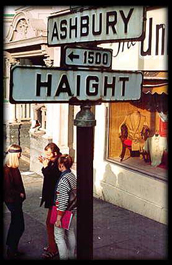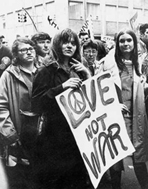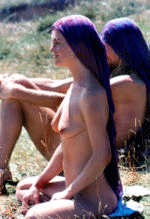THE HIPPIES
On 5 September 1965, in an article in the San Francisco Examiner about the new "Bohemian" scene developing in the Haight-Ashbury district, Michael Fallon labeled its members "hippies."
Hippies were originally part of a youth movement composed mostly of white teenagers and young adults between the ages of 15 and 25. Inheriting a tradition of cultural dissent from the bohemians and the beatniks, hippies rebelled against established institutions, criticized middle class values, opposed the Vietnam War, embraced aspects of non-Judeo-Christian religions, promoted sexual liberation and the taking of psychedelic drugs, and created intentional communities.
They experimented with drugs, exhibited an unconventional appearance, enjoyed new forms of "acid" music and art, investigated exotic religions.
They perceived the dominant culture as a corrupt, monolithic entity that exercised undue power over their lives, calling this culture "The Establishment", "Big Brother", or "The Man". The hippie ethos spread worldwide through a fusion of early rock, folk, blues, and psychedelic rock.
From beatniks to hippies
In the US the Beat Generation gradually gave way to the Sixties counterculture, accompanied by a shift in terminology from "beatnik" to "hippie."
Stylistic differences between beatniks, marked by somber colors, dark shades, and goatees, gave way to colorful psychedelic clothing and long hair worn by hippies. While the beats were known for "playing it cool" and keeping a low profile, the hippies became known for "being cool", and displaying their individuality. While the beats tended to be essentially apolitical, the hippies became active in the civil rights and anti-war movements.
Haight-Ashbury
Some of the earliest San Francisco hippies were former students at San Francisco State College who were intrigued by the developing psychedelic hippie music scene and "dropped out" after they started taking psychedelic drugs. Young Americans around the country began moving to San Francisco, and by June 1966, around 15,000 hippies had moved into the Haight.
 By 1967, the neighborhood's fame chiefly rested on the fact that it became the haven for a number of important psychedelic rock performers and groups of the mid-1960s. Acts like Jefferson Airplane, the Grateful Dead and Janis Joplin all lived a short distance from the famous intersection. They not only immortalized the scene in song, but also knew many within the community as friends and family. By 1967, the neighborhood's fame chiefly rested on the fact that it became the haven for a number of important psychedelic rock performers and groups of the mid-1960s. Acts like Jefferson Airplane, the Grateful Dead and Janis Joplin all lived a short distance from the famous intersection. They not only immortalized the scene in song, but also knew many within the community as friends and family.
The fabric of the neighborhood was forever altered in 1967 during the Summer of Love, much to the dismay of many residents. Psychedelic rock music was entering the mainstream, and received more and more commercial radio airplay. The Monterey Pop Festival in June further cemented the status of psychedelic music as a part of mainstream culture and elevated local Haight bands to national stardom.
Time Magazine’s cover story on "The Hippies: Philosophy of a Subculture", the CBS News television report on "The Hippie Temptation" and other major media interest in the hippie subculture exposed the Haight-Ashbury district to enormous national attention and popularized the movement across the country and around the world. Thousands of young people migrated to the Haight-Ashbury district.
The Diggers
Hippie action in the Haight centered around the Diggers, a guerrilla street theatre group that combined spontaneous street theatre, anarchistic action, and art happenings in their agenda to create a "free city." The Diggers grew from two radical traditions thriving in the area during the mid-1960s: the bohemian/underground art/theater scene, and the new left/civil rights/peace movement.
By late 1966, the Diggers opened stores which simply gave away their stock; provided free food, medical care, transport and temporary housing; they also organized free music concerts and works of political art.
Summer of Love
On January 14, 1967, the outdoor Human Be-In in San Francisco popularized hippie culture across the United States, with 20,000 hippies gathering in Golden Gate Park. The Monterey Pop Festival from June 16-18 introduced the rock music of the counterculture to a wide audience and marked the start of the "Summer of Love."
Regarding this period of history, Time Magazine’s cover story entitled, "The Hippies: The Philosophy of a Subculture" described the guidelines of the hippie code:
"Do your own thing, wherever you have to do it and whenever you want. Drop out. Leave society as you have known it. Leave it utterly. Blow the mind of every straight person you can reach. Turn them on, if not to drugs, then to beauty, love, honesty, fun."
Lifestyles
Hippies were pacifists and participated in non-violent political demonstrations, such as civil rights marches, the marches on Washington D.C., and anti-Vietnam War demonstrations, including draft card burnings and the 1968 Democratic Convention protests.
 In addition to non-violent political demonstrations, hippie opposition to the Vietnam War included organizing political action groups to oppose the war, refusal to serve in the military and conducting "teach-ins" on college campuses that covered Vietnamese history and the larger political context of the war. In addition to non-violent political demonstrations, hippie opposition to the Vietnam War included organizing political action groups to oppose the war, refusal to serve in the military and conducting "teach-ins" on college campuses that covered Vietnamese history and the larger political context of the war.
Hippie political expression often took the form of "dropping out" of society to implement the changes they sought. The back to the land movement, cooperative business enterprises, alternative energy, the free press movement, and organic farming were all politically motivated movements aided by hippies.
Sexual attitudes
Hippies regularly flouted societal prohibitions against interracial dating and marriage.
 With their emphasis on Free Love, hippies promoted many of the same counterculture beliefs that found early expression in the Beat Generation. Co-habitation among unmarried couples was the norm, open relationships were common, and both Beats and Hippies advocated for legal and societal acceptance of most forms of consensual sexual expression among adults. With their emphasis on Free Love, hippies promoted many of the same counterculture beliefs that found early expression in the Beat Generation. Co-habitation among unmarried couples was the norm, open relationships were common, and both Beats and Hippies advocated for legal and societal acceptance of most forms of consensual sexual expression among adults.
With regard to homosexuality and bisexuality, the Beats had demonstrated early tolerance during an era when homosexual expression of any sort was still punishable by stiff prison sentences. Hippies generally espoused the same tolerant attitude.
|

